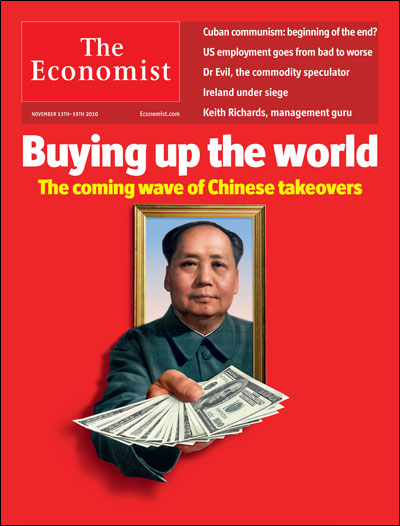The decline of the West? Again??
Back in the 1980s, America was gripped by angst. An up-and-coming Asian powerhouse economy was on a seemingly unstoppable rise. The US consumer electronics industry was dead (the last US manufacturer of televisions sets, Zenith, was on the road to bankruptcy and the eventual takeover by Korea’s LG during the 1990s); the most iconic American industry, automobiles, was on the ropes as well, with Chrysler having been bailed by the US government in 1979 and GM and Ford losing market share to Toyota, Honda and other Asian car makers. In 1989, a book was published, co-written by Sony’s founder Akio Morita and a member of the Japanese parliament, Shintaro Ishihara; the title was “The Japan that can say NO” (to America, of course), and the review of the book on Amazon reads as follows:
The author, a leading Japanese statesman, asserts in this book that the balance of power has shifted and that Japan will no longer play polite sister to the US in world affairs. He claims that Japan could instantly overturn US military superiority by selling its crucial computer missile chip to the USSR. He therefore stresses that it is time for the US corporations to listen to Japanese advice on achieving long-term economic strength instead of relying on trade sanctions to bail them out. He is also convinced that America’s racial prejudice, which resulted in dropping the atomic bomb on Japan and not Germany, remains rampant and is a persistent cause of friction between the two countries. This book therefore helps the reader to understand a changing world in which Japan moves towards economic and technological supremacy. A long-time member of the Japanese Parliament, Shintaro Ishihara is the award-winning author of several literary novels and the President of PEN Japan.
The same year, 1989, an ultimate insult from the new rising power: one of New York’s most iconic pieces of real estate, the Rockefeller Center, was purchased by Mitsubishi Estate. This was not just some building–two years earlier it had been added to the National Register of Historic Places. And now it was in Japanese hands…
Does this sounds familiar? Fast forward to 2010. A rising Asian power is asserting itself, and the West is scared. The Economist, in its Christmas issue, has a leader about the West’s decline and the rise of China, India etc. The November 13th issue of The Economist carried this cover:
But what happened to that rising power of 20 years ago? The country that was “moving towards economic and technological supremacy?” Today, Japan is held up as a failed state; not failed in the sense of Pakistan or Somalia, but still a country that is in terminal decline, now no longer the world’s 2nd largest economy (depending on how you count), with an aging population, a huge national debt and two decades of little or no growth and a political system seemingly unable to deal with the country’s problems. So now we must all be awed by and scared of China’s rise. The West has had a good 400 years of dominance, but now it is the turn of others.
There are at least two problems with this line of thinking. Just as the angst over Japan 20 years ago was fuelled by factors that proved transitory (US recession, strong Yen that made Western firm easy for Japanese firms to take over, etc.), so it is now. China and India have not been particularly damaged by the financial crisis, mainly because their banking systems were so primitive that they were in effect de-linked from the global financial system. In other words, they just got lucky.
More fundamentally, what is often neglected that the new emerging powers have gotten richer in one of two ways: either by being fortunate enough to have lots of stuff in the ground or other natural resources that the rest of the world wants to buy (Russia, the Arabian peninsula, Brazil to a lesser extent), or by using Western ideas and technology to develop their economies and societies–in effect, by becoming more Western. China’s and India’s economic development took off only when they adopted Western ideas such as free enterprise; and the tension between economic freedom and party control is an issue that will yet need to be resolved in China, whether by violent upheaval or peaceful means.
It is instructive to look at the list of Nobel laureates. Not a perfect measure by any means, but certainly a way to gauge a country’s contribution to humanity’s stock of scientific knowledge and culture. Of the 800+ Nobel laureates to date, 12 are listed as being from the People’s Republic of China. Nine of those 12 prizes are in science, but not a single one of these scientists actually lives in China. Of the other 3 recipients, one is for literature (2000) but lives in France (and his works are banned in China), and the remaining two are Peace Prize winners: the Dalai Lama in 1989 and the dissident Liu Xiaobo in 2010. Enough said.
The reports of the West’s demise are grossly exaggerated. On the contrary, the only countries that have seen material progress in the past decades are those that adopt Western ideas, technology, and yes, ultimately, democracy.

I agree on most what you say, I keep answering myself about what’s fair trade/economy, which didn’t happened before with Japan. Althought everyone loves cheap production prices (like we can get in China, India, or many other places) there is an inherent contradiction with how it is achieved and what we were going to accept (or even if it’s legal) if that was happening here, so it’s somewhat falling about the terms of competence.
Ya know… out of sight, out of mind. Althought still there and not for good.